Question of Week | “I want to get rid of my diabetes”

PZ is very upset that they were just diagnosed with diabetes and state “I want to get rid of this diabetes”. PZ has a BMI of 35 and elevated LDL cholesterol levels. Both of PZ’s parents had diabetes and died due to complications.
Based on the newly released ADA/EASD Consensus Statement, which intervention is recommended to get blood sugars to target and possibly lead to type 2 remission?
- Start an SGLT-2 Inhibitor plus metformin
- Lose 10-15% of current weight
- Immediately initiate a walking and strength training program.
- Encourage insulin pump therapy to preserve beta cell function.
Click Here to Test your Knowledge
Want to learn more about this question? Join us for our
Meds for Type 2 Update; New ADA/EASD Consensus Statement
Level 2 | 1.25 CEs
Airs live on Wednesday, December 1st at 11:30 am PST
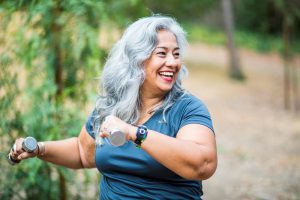
Plan on joining this exciting webinar that walks participants through the newly released, “Management of Hyperglycemia in Type 2 Consensus Report by the ADA and EASD”. These updated guidelines will be incorporated into the 2023 ADA Standards of Care, but you can get a early sneak peak by joining Coach Beverly on December 1st, 2022. She will highlight the revised guidelines with a focus on new elements and exciting changes on how we approach medication management for type 2 diabetes. Together, we will explore clinical factors to consider when determining the best strategy to improve glucose management in people with type 2 diabetes and other co-conditions. There will be a special focus on cardiovascular risk reduction and renal protection and addressing clinical inertia.
Objectives:
- Describe the role of Diabetes Care and Education Specialists in advocating for optimal therapeutic approaches.
- Discuss the application of the new ADA/EASD Guidelines to improve glucose and reduce CV and renal risk.
- List strategies to initiate and adjust oral and injectable therapy using a person-centered approach
Intended Audience: A great course for health care professionals seeking evidence-based information that improves the quality of life and outcomes.
Don’t worry if you can’t make it live. Your registration guarantees access to the recorded version in the Online University.
All hours earned count toward your CDCES Accreditation Information
Sign up for Diabetes Blog Bytes – we post one daily Blog Byte from Monday to Friday. And of course, Tuesday is our Question of the Week. It’s Informative and FREE! Sign up below!
The use of DES products does not guarantee the successful passage of the CDCES exam. CBDCE does not endorse any preparatory or review materials for the CDCES exam, except for those published by CBDCE.
A Thanksgiving Note of Gratitude
In this season of gratitude, we want to express our appreciation for our community! We understand the important work you all do every day to support individuals living with and managing diabetes and prediabetes.

We are so thankful for the differences you all make in the world as you address disparities and improve the health of communities locally and across the nation.
We have been so inspired by our students and are so proud of each achievement. If you have a moment, stop by our CDCES Success Stories page to read about the incredible journeys students have taken to become diabetes educators.
At Diabetes Ed Services, we work diligently every day to provide diabetes information that is relevant, compassionate and cutting edge. We believe in the potential of all students, from people living with diabetes to health care professionals striving to enhance their knowledge. Thank you for being a part of our lives and community.
We will be closing shop starting today for the holidays. We will open our doors at 7am on Monday, well rested, a few pounds heavier and ready for our Cyber Monday Sale.
On behalf of the entire Diabetes Education Services Team, Happy Thanksgiving!
Save the Date: DiabetesEd Cyber Monday Sale
For one day only all Online Programs are 30% off!
Use code “Cyber30” during checkout on November 27th!

Sign up for Diabetes Blog Bytes – we post one daily Blog Byte from Monday to Friday. And of course, Tuesday is our Question of the Week. It’s Informative and FREE! Sign up below!
The use of DES products does not guarantee the successful passage of the CDCES exam. CBDCE does not endorse any preparatory or review materials for the CDCES exam, except for those published by CBDCE.
Question of Week | How much insulin for Turkey Dinner?

JR is going to a friend’s house for Thanksgiving. JR has type 1 diabetes and is nervous about figuring out how much insulin to take with this carb heavy celebration.
What would be the best approach?
- Encourage JR to eat a meal at home before they arrive, so they won’t be tempted by high carb choices.
- Ask JR to write up a list that summarizes the pros and cons of eating extra carbs on a special holiday.
- Give JR a hug and recognize how hard holidays can be, while encouraging JR to share their feelings.
- Discuss JR’s favorite Thanksgiving foods and review carb servings and strategies to reach JR’s goals.
Click Here to Test your Knowledge
~Save the Date~
Our Cyber Monday Sale is on Monday, Nov 28th!
For one-day-only Save 30% on ALL Online University Courses
For 24 hours only | Take 30% off all of our
DiabetesEd Online Courses including:
Online Courses, Online Course Bundles and Online Bundle Extensions
Use code “CYBER30” on the payment page during checkout.
Sale starts today, Nov 28th at 12:00 am and Ends Nov 28th at 11:59 pm
Save over $200 when enrolling in our Complete Package on Cyber Monday
This is our most economical package pricing yet! Earn CEs and receive a comprehensive overview of the science and art of diabetes education with a ton of exam practice questions. The complete package equips you with everything you need to achieve exam success and includes:
Complete Package Online Courses Include:
- Level 1 focuses on the fundamentals and introduces each topic area for the exam.
- Level 2 deep dives into the ADA Standards of Care,
- Level 3 AKA Boot Camp is a more accelerated level that focuses on test simulation for finding the best answer to get you to the finish line of your study path.
- Level 4 – focuses on the more advanced level specialty topics.
- Technology Toolkit which gives information on pumps, sensors, and calculations,
- Test Taking Toolkit includes over 220 practice questions for test simulation plus a webinar where Coach Beverly provides test-taking tips based on her experience taking the certification exam six times. This webinar airs on Dec. 13th! Click here to read more.
Complete Package Includes these Books & Pocketcards:
- ADCES Review Guide for the Diabetes Care and Education Specialist Exam – 5th Edition – Revised – The ADCES Review Guide is a fantastic independent study tool and comprehensive resource for the Diabetes Care and Education Specialist Exam. This book includes 480 + multiple-choice questions and strategies for preparing for and taking the exam with an answer key with rationales for all questions!
- The Art and Science of Diabetes Care and Education – 5th Edition – this book is a go-to resource for the core knowledge and skills for providing person-centered care and education to persons with diabetes and related chronic conditions. This is a core resource for those who are studying for the certification exams.
- Medication PocketCard – Our four-sided medication accordion Pocketcards were designed by Coach Beverly Thomassian to assist in clinical practice and exam preparation.
- Tote Bag
Don’t worry if you can’t make it live. Your registration guarantees access to the recorded version in the Online University.
All hours earned count toward your CDCES Accreditation Information
Sign up for Diabetes Blog Bytes – we post one daily Blog Byte from Monday to Friday. And of course, Tuesday is our Question of the Week. It’s Informative and FREE! Sign up below!
The use of DES products does not guarantee the successful passage of the CDCES exam. CBDCE does not endorse any preparatory or review materials for the CDCES exam, except for those published by CBDCE.
Can’t afford Insulin? Strategies that can help
The cost of insulin is a real problem. According to an analysis of data from the CDC’s 2021 National Health Interview Survey, 1.3 million Americans with diabetes, or 16.5% of insulin users in the U.S. rationed their insulin in the past year due to the high costs of this life-saving hormone.
Insulin rationing is more common in adults under the age of 65, middle-income individuals, and Black Americans. This lack of insulin results in chronic hyperglycemia, intensifying the risk of diabetes-related complications, worsening quality of life, and can even lead to hospitalization and death.
In the 2021 National Health Survey, 16.5% of respondents living in the US, rationed insulin in the past year.
The retail price for a box of insulin pens (1,500 units) is about $500. A vial of insulin (1000 units) varies from $160 to $400. For this reason, many insulin companies offer coupons or biosimilar versions of certain insulins. However, these cost savings aren’t enough for many individuals.
Hopefully, the 2022 Inflation Reduction Act, will at least improve insulin access for seniors with Medicare by limiting insulin copays to $35 per month. However, a similar cap for the privately insured was removed from the bill, and copay caps do not aid the uninsured. Further reform is needed to improve access to insulin for all Americans.
Why is insulin so expensive?
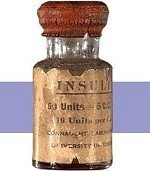
According to a very compelling article published by USC, the insulin distribution intermediaries, or Pharmacy Benefits Managers (PBMs), are significantly contributing to increasing insulin costs.
A USC cross-sectional study of the U.S. insulin market was conducted in 2020 using 2014-2018 data from multiple sources. The study analyzed the flow of funds throughout the insulin distribution system which includes manufacturers, drug wholesalers, pharmacies, health plans, and (PBMs).
According to the USC study, in 2014, 70% percent of insulin revenue was going to the manufacturers and 30% of the insulin revenue went to the PBM middlemen, but by 2018, only 47% was going to the manufacturers. The intermediaries—mostly PBM’s and pharmacies–were pocketing the rest, a whopping 53% share of the revenue from insulin sales.
In light of this complicated insulin distribution system, more needs to be done to uncover these issues and get to the root of unaffordable insulin for the millions of people who rely on it every day.
Here are different strategies to access affordable insulin.
Until we get a handle on the cost of insulin, here is some helpful information and programs that can make insulin more affordable.
Insulin Affordability Guide from ADCES
Insulin Affordability Guide helps make navigation easier ADCES Access & Affordability page with Insulin Cost-Savings Resource Guide. Insulin Cost Savings Guide
ReliOn Insulins $25 a Vial
Walmart and some other pharmacies also offer ReliOn insulins. These include Novolin R, Novolin N, and Novolin 70/30. For people with type 2 diabetes and some with type 1, these insulins offer an affordable option. They are only $25/vial or $44/5 pack of pens and do not require a prescription in most states. Access to these insulins can be truly life-saving in some circumstances. Every person with diabetes needs to be aware that they can purchase these insulins without a prescription if they are ever out of insulin.
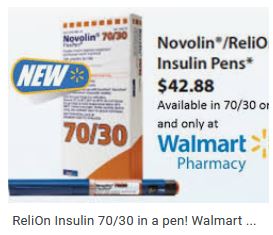
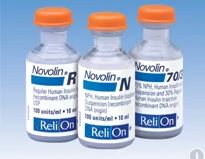
Other Options
Generic Insulins
Because insulin is a biologic drug, a true generic must come from the same manufacturer. Recently Lilly and Novo Nordisk have created generic insulins.
Lilly offers generics of insulin lispro, insulin lispro mix 75/25, and insulin lispro junior kwik pen.
Novo Nordisk offers generics of their insulin, which they are calling a “follow on Brand” and includes insulin apart and insulin Aspart mix 70/30.
Both Lilly and Novo offer approximately 50% cost savings from the original insulin product and the pharmacist can make an automatic substitution if you ask.
Co-Pay Cards
Most insulins offer a co-pay card which can bring down the price of insulin most commonly to $0 to $25/month depending on the manufacturer and type of insulin. For any person with a commercial insurance plan, it’s good to check if a co-pay card is available for the insulin before picking it up from the pharmacy.
The things to be aware of about these cards are that they have maximum savings and sometimes that is much less than the total cost of the insulin. Also, they only work for people with commercial insurance meaning they won’t for people without health insurance or that have a government insurance plan like Medicare. They also do not always work if the drug is not covered by the insurance plan. In that case, it would be preferable to switch to insurance covered by the insurance plan.
Assistance Plans
These are programs offered through pharmaceutical companies for people without health insurance or that have Medicare but still struggle to pay for medications. There are various income requirements to be eligible, but depending on the program it can be 250-400% above the Federal poverty line. Many people are surprised to find that they are eligible, so this is a good option to look into which can make insulin completely free. There is typically a packet of information that needs to be completed and then if eligible, the insulin is shipped to the prescriber’s office for the patient to pick up.
In summary, more needs to be done to make insulin more affordable. As diabetes specialists, we can write to our congresspeople and advocate on behalf of people living with diabetes, to ensure that people no longer have to ration insulin.
References
- ADA Standards of Care – Standard 9, the chart on Average Wholesale Price of Insulin
- Annals of Internal Medicine – Prevalence and Correlates of Patient Rationing of Insulin in the United States: A National Survey, Adam Gaffney, MD, MPH, David U. Himmelstein, MD, Steffie Woolhandler, MD, MPH
- CNN Report on Insulin Rationing
Insulin prices are skyrocketing, but just who is driving the rise in costs? Hint: it’s not the drug manufacturers – USC - For a summary of all this information, see the ADCES Insulin Cost Savings Resources Page.
The use of DES products does not guarantee the successful passage of the CDCES exam. CBDCE does not endorse any preparatory or review materials for the CDCES exam, except for those published by CBDCE.
Question of Week | Bolus insulin to cover steak and salad?

JT tells you, “if I have a steak and salad for dinner, I will give myself 2-3 units of bolus insulin”.
What is the best response?
- That could be dangerous, since bolus insulin is used to cover carbs.
- How many times has your glucose dropped using that approach?
- I am curious to know how that has affected your post meal glucose.
- Giving the insulin after the meal might be a better idea.
Click Here to Test your Knowledge
Want to learn more about this question? Join our NEW
ReVive 5 Diabetes Training Program
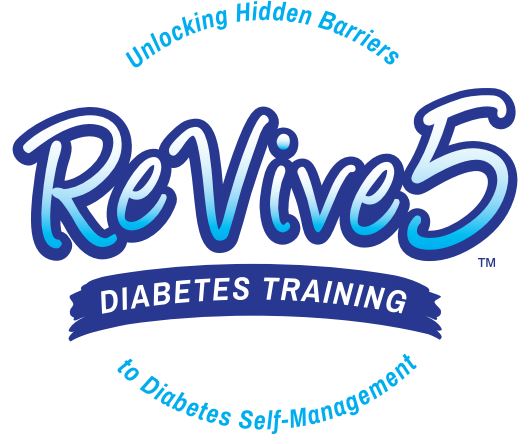
Whether you are a novice or an expert in providing diabetes care, we invite you to attend this exciting training program that provides the essential steps to address diabetes distress combined with an innovative approach to glucose management that will revolutionize your practice.
“ReVive 5” breathes new life into our relationship with diabetes, bringing a fresh perspective to both the person with diabetes and the provider.
Join our Team of Experts
Team of Experts:
ReVive 5 is taught by a team of 3 Interdisciplinary Experts:
- Lawrence Fisher, Ph.D., ABPP, Professor Emeritus, UCSF
- Susan Guzman, PhD
- Beverly Thomassian, RN, MPH, CDCES, BC-ADM
Training Program Includes:
- 14.0 CEs – Includes the 4 Session ReVive Training Program, Certificate and 5 FREE bonus courses to supplement content
(Four 1.5 hour training sessions (6.0 CEs) plus Five bonus courses worth 9.0 CEs for the Deluxe Registration - Quarterly 1 hour follow-up sessions with an expert -dates to be announced
- A comprehensive set of assessment tools, educational materials, log sheets and resources.
Speakers Interviews – Learn more about the ReVive 5 Team
What is the Biggest Takeaway when Addressing Diabetes Distress? – Dr. Susan Guzman
Do you have to be a Mental Health Expert to Tackle Diabetes Distress? – Dr. Lawrence Fisher
Why I Transformed my Approach to Diabetes Self-Management Education- Coach Beverly
Don’t worry if you can’t make it live. Your registration guarantees access to the recorded version in the Online University.
All hours earned count toward your CDCES Accreditation Information
Sign up for Diabetes Blog Bytes – we post one daily Blog Byte from Monday to Friday. And of course, Tuesday is our Question of the Week. It’s Informative and FREE! Sign up below!
The use of DES products does not guarantee the successful passage of the CDCES exam. CBDCE does not endorse any preparatory or review materials for the CDCES exam, except for those published by CBDCE.
Happy World Diabetes Day
I love November because we get to celebrate National Diabetes Month and World Diabetes Day on November 14th, which is Dr. Banting’s Birthday.
One hundred and one years ago, two researchers kick-started the production of insulin, making it available for worldwide use and saving millions of lives. Now, that’s a real cause for celebration. The discovery of insulin by Banting, Best, and team was no easy feat. They encountered resistance, setbacks, and failures.

Dr. Banting secured space to test out his theory at the University of Toronto during a hot summer in 1921. Along with his colleague, Charles Best, and a bare-bones lab, they conducted dozens of experiments on dogs. Marjorie (dog 408) lived for 70 days without a pancreas due to receiving life-saving insulin injections.
This success was replicated in other experimental dogs and ultimately provided the first step toward producing insulin from pig and cow pancreases.
In 1922, children with type 1 diabetes started receiving early doses of this newly available life-saving hormone. Leonard Thompson, was the first recipient in January 1922, followed by many thereafter. Here is a heartbreaking then uplifting photo of J.L., who after 2 months of receiving insulin, transformed into a healthy young boy.
To learn more about the Discovery of Insulin and download historical slides Click here!

We are Celebrating Diabetes Month with Giveaways and 30% Sale on Nov 28th
For the month of November:
- Join or View our 3 FREE webinars
- FREE Tote Bag + Pocket Card with Book or Teaching Tool Purchase
- Cyber Monday Sale – 30% off Online Courses on November 28th.
Sign up for Diabetes Blog Bytes – we post one daily Blog Byte from Monday to Friday. And of course, Tuesday is our Question of the Week. It’s Informative and FREE! Sign up below!
[yikes-mailchimp form=”1″]Accreditation: Diabetes Education Services is an approved provider by the California Board of Registered Nursing, Provider 12640, and Commission on Dietetic Registration (CDR), Provider DI002. Since these programs are approved by the CDR it satisfies the CE requirements for the CDCES regardless of your profession.*
The use of DES products does not guarantee the successful passage of the CDCES exam. CBDCE does not endorse any preparatory or review materials for the CDCES exam, except for those published by CBDCE.
Rationale of the Week | What do new ADA/EASD Standards Recommend?

For last week’s practice question, we quizzed test takers on the new ADA/EASD Standards. 56% of respondents chose the best answer. We want to clarify and share this important information, so you can pass it on to people living with diabetes and your colleagues, plus prepare for exam success!
Before we start though, if you don’t want any spoilers and haven’t tried the question yet, you can answer it below: Answer Question
Question:
The new ADA /EASD Management of Hyperglycemia in Type 2 Consensus Statement 2022 was just released.
Which of the following is an accurate recommendation according to these updated guidelines?
Answer Choices:
- Initiate treatment with metformin for most individuals, including those with cardiovascular disease.
- If A1C not at target with 2 or more oral agents, add on basal insulin therapy.
- Avoid the use of SGLT-2 Inhibitors in those with an eGFR of less than 25.
- Prioritize the use of organ protective medications in those with cardiorenal disease.
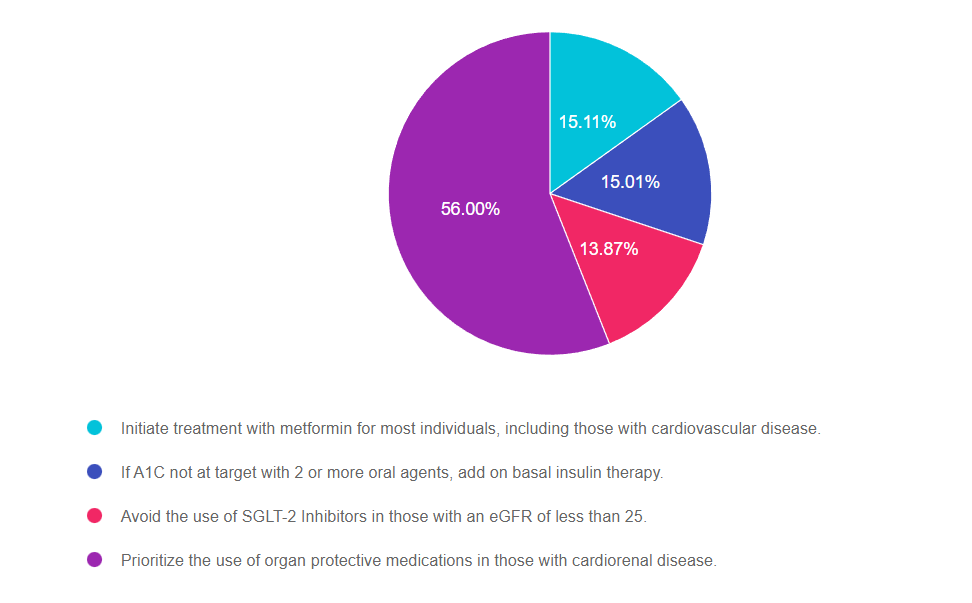
Getting to the Best Answer
Answer 1 is incorrect. 15.11% chose this answer, Initiate treatment with metformin for most individuals, including those with cardiovascular disease.” In the past, this would have been the best answer, but based on latest guidelines, metformin is no longer the only first treatment. Based on the individual and our risk assessment (ie heart or renal failure or elevated CV risk) we could choose a SGLT-2 or GLP-1 as first line therapy.
Answer 2 is incorrect. 15.01% of you chose this answer, If A1C not at target with 2 or more oral agents, add on basal insulin therapy.” With the guidelines, they strongly suggest starting a GLP-1 RA before starting basal insulin as the first choice if possible. GLP-1 is preferred since insulin therapy is associated with hypoglycemia and weight gain, while the GLP-1’s is associated with weight loss, CV risk reduction and no hypoglycemia.
Answer 3 is incorrect. 13.87% of respondents chose this answer, “Avoid the use of SGLT-2 Inhibitors in those with an eGFR of less than 25.” This is a juicy answer, but the new guidelines encourage the use of SGLT-2 Inhibitors in people with diabetes with a GFR of 20 or greater, stopping SGLT-2 therapy when dialysis is started. Even with stage 3 & 4 kidney failure, SGLT-2’s can effectively slow the progression of kidney disease and improve CV outcomes in people with diabetes.
Finally, Answer 4 is correct. 56.00% chose this answer, Prioritize the use of organ protective medications in those with cardiorenal disease.” YES, GREAT JOB. This is the best answer. We are encouraged to target therapy based on the individual and to protect organs. For people with renal and heart failure, SGLT-2’s are the preferred class and for people with CV disease, starting either a GLP-1 or SGLT-2 decreases risk of major adverse cardiovascular events (MACE). We hope you can join our webinar on December 1st to learn more.
Want to learn more about this question? Join us for our
Meds for Type 2 Update
Level 2

Plan on joining this exciting webinar that walks participants through the newly released, “Management of Hyperglycemia in Type 2 Consensus Report by the ADA and EASD”. She will highlight the revised guidelines with a focus on new elements and exciting changes on how we approach medication management for type 2 diabetes. Together, we will explore clinical factors to consider when determining the best strategy to improve glucose management in people with type 2 diabetes and other co-conditions. There will be a special focus on cardiovascular risk reduction and renal protection and addressing clinical inertia.
Objectives:
- Describe the role of Diabetes Care and Education Specialists in advocating for optimal therapeutic approaches.
- Discuss the application of the new ADA/EASD Guidelines to improve glucose and reduce CV and renal risk.
- List strategies to initiate and adjust oral and injectable therapy using a person-centered approach
Intended Audience: A great course for health care professionals seeking evidence-based information that improves the quality of life and outcomes.
Don’t worry if you can’t make it live. Your registration guarantees access to the recorded version in the Online University.
Question of Week | Why are you worried that RT keeps using same site?

RT says they keep using the same site for their insulin pump, since it doesn’t hurt as much. When you evaluate their abdomen, you notice a large lump at the site.
Why are you worried about this practice?
- Magnified risk of hypoglycemia
- Acanthosis nigricans
- Development of a lipoma
- Decreased insulin absorption
Click Here to Test your Knowledge
It’s election day. Let’s make sure to get to out and Vote!
Want to learn more about this practice question? Join our NEW
ReVive 5 Diabetes Training Program

Whether you are a novice or an expert in providing diabetes care, we invite you to attend this exciting training program that provides the essential steps to address diabetes distress combined with an innovative approach to glucose management that will revolutionize your practice.
“ReVive 5” breathes new life into our relationship with diabetes, bringing a fresh perspective to both the person with with diabetes and the provider.
By releasing old habits that no longer serve us, we have the opportunity to create a new life tool kit toolkit in partnership with the person living with diabetes.
The ReVive 5 program is built on international research study results and will revolutionize your approach to diabetes self-management education.
Join our Team of Experts
Team of Experts:
ReVive 5 is taught by a team of 3 Interdisciplinary Experts:
- Lawrence Fisher, Ph.D., ABPP, Professor Emeritus, UCSF
- Susan Guzman, PhD
- Beverly Thomassian, RN, MPH, CDCES, BC-ADM
Training Program Includes:
- 6.0 CEs – Includes the 4 Session ReVive Training Program, Certificate and 5 FREE bonus courses to supplement content
(Four 1.5 hour training sessions (6.0 CEs) plus Five bonus courses worth 9.0 CEs for the Deluxe version. - Quarterly 1 hour follow-up sessions with an expert -dates to be announced
- A comprehensive set of assessment tools, educational materials, log sheets and resources.
Don’t worry if you can’t make it live. Your registration guarantees access to the recorded version in the Online University.
All hours earned count toward your CDCES Accreditation Information
Sign up for Diabetes Blog Bytes – we post one daily Blog Byte from Monday to Friday. And of course, Tuesday is our Question of the Week. It’s Informative and FREE! Sign up below!
The use of DES products does not guarantee the successful passage of the CDCES exam. CBDCE does not endorse any preparatory or review materials for the CDCES exam, except for those published by CBDCE.








